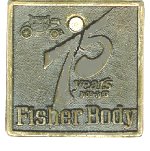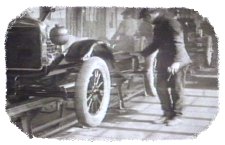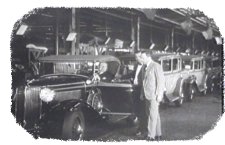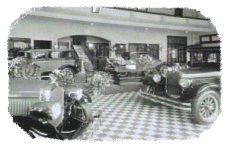|


|
HISTORICAL HIGHLIGHTS
OF FISHER BODY DIVISION
THE FIRST 75 YEARS
|
 |
 |
July 22,1908
Fred, Charles and Uncle, Albert Fisher
organize Fisher Body Company in Detroit,
capitalized at $50,000.
1910
Fisher Body Company receives order for 150
closed Cadillac bodies.
1912
Fisher Body Company of Canada, Ltd., organized.
1914
Capacity now 105,000 bodies a year; outstanding
growth these first six years.
1916
Three Fisher companies merge into one corporation;
capacity lumos to 370,000 bodies per year, making
Fisher the largest auto body manufacturer in the
world.
1917-18
World War I production includes 2,005 airplanes
at the new Detroit Plant (later fleetwood)
1919
GM Buys 60% interest in the Fisher Body Corp. for 26.7 million. Fisher Bros retain management control of their company, agree to supply bodies for all GM cars for 10 years. Company builds first major plant outside Detroit in Cleveland
|
THE 1920'S
|
 |
 |
1920
Fisher acquires Ternstedt Manufacturing Co. to
make body hardware. Also acquires own glass firm,
National Plate Glass Company
1921
Fisher and Ternstead introduce modern window regulator.
1923
Duco laquers introduced, reducing drying time
from four weeks to six hours. Three Fisher brothers -
Fred, Charles, Lawrence elected to GM Board
of Directors.
1925
Fisher Body Corp. acquires Fleetwood Body Corp.
of Pennsylvanla as its custom body adjunct
1926
GM buys remaining 40% of Fisher stock for
$208 million, makes Fisher a corporate division.
1927
Fisher originates the narrow front pillar post for
vision safety.
|
THE 1930'S
|
 |
 |
1930
Fisher is first to slant windshields to eliminate
headlight glare in night driving.
1933
No-Draft Ventilation, locking door handles and front
door armrests introduced.
1934
Fred and Charles Fisher retire from active GM
participation.
1935
All-steel Turret Top introduced ... Fisher establishes.
acoustical laboratory.
|
THE 1940'S
|
 |
 |
1940-45
Fisher turns exclusively to wartime production. Four
remaining Fisher brothers retire from active GM
participation in 1944.
1948
Ternstedt subsidairy becomes separate GM division.
1949
Fisher introduces first hardtop body styling-the
hardtop coupe for Buick.
|
THE 1950'S
|
 |
 |
1954
Wrap-around windshields debut in standard car production
1955
Fisher pioneers 4-door hardtop; introduces
impact resistant door locks.
1958
Acrylic lacquer paint introduced by Fisher.
1959
Fisher begins to build first integral body for rear-
engine car, the Corvair. Division becomes pioneer
and automotive leader in the use of computer
graphics as evolution of computer systems begins.
|
THE 1960'S
|
 |
 |
1961
Three additional unit-bodied compacts introduced:
Pontiac Tempest, Olds F-85, Buick Special.
GM fields 108 separate body lines.
1962
Adhesive caulking eliminates rubber moldings from
non-moving glass.
1965
Front seat belts become standard. Frameless glass
introduced on all hardtops.
1967
All new sporty Pontiac Firebird and Chevrolet
Camaro bodies roll off Fisher Body Norwood, OH
assembly lines... First application of robots on
assembly line installed at Norwood. More robots
installed at NorWood and at Lordstown Plants in
1970. . . Fisher builds body for 100-millionth car at
Janesville, Wis. plant.
1968
Ternstedt again united with Fisher Body.
1969
Side-impact beams introduced by Fisher as an
industry first; later adopted as federal Standard
|
THE 1970'S
|
 |
 |
1970
Full-foam seating introduced as industry-first on
Firebird and Camaro.
1973-74
Oil crisis in Mideast brings new challenge to Fisher
Body as plans emerge to downsize all models, cut
energy use in plants... Work on air bag
development since 1969 results in offering
controversial units as option in some models (1974-
76). Fisher also has responsibility for developing
starter interlock feature, a mandatory device later
repealed by Congress.
1976
Fisher engineers meet challenge with first all-metric
and mini-size GM car - the Chevette.
1977
700 pounds removed from full-size cars as
massive downsizing program begins ... Fisher
assigned as passive belt Project Center for GM. Also
now holds corporate responsibilities for paint and
corrosion protection, and sunroof/hatchroof
development.
1979
Fisher Body expands production beyond U.S.
borders - Mexico (I979); Northern Ireland (1980);
Spain (1982).
1981
Already a recognized leader in computer-aided
design (CAD), Fisher also pioneers computer-aided
manufacturing (CAM) devices, such as laser beam
and gamma ray inspection, three-dimensional laser
vision-equipped welding robots and other high-tech
automated equipment.
1983
Fisher Body celebrates its 75th Anniversary,
****************************
|




